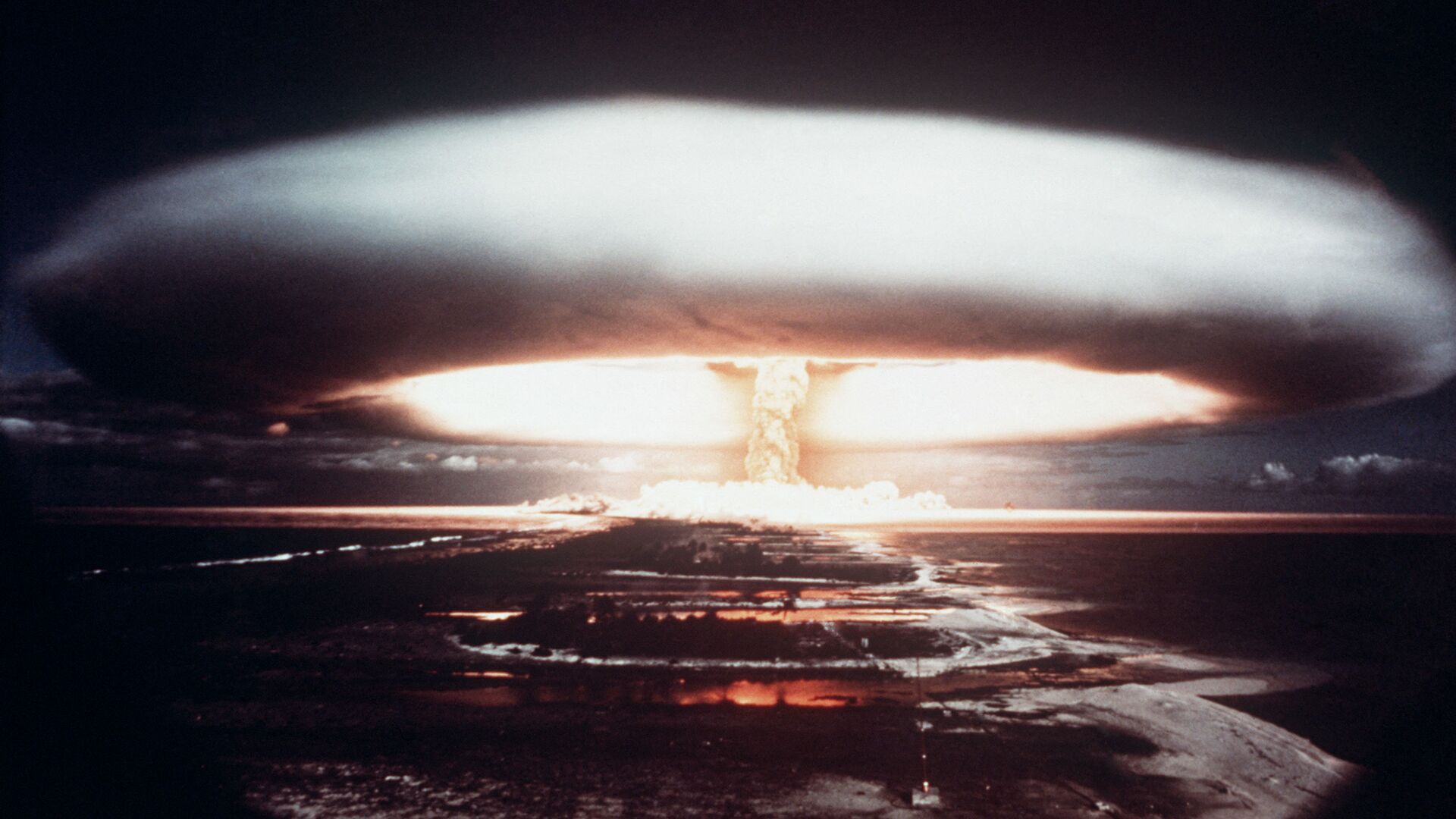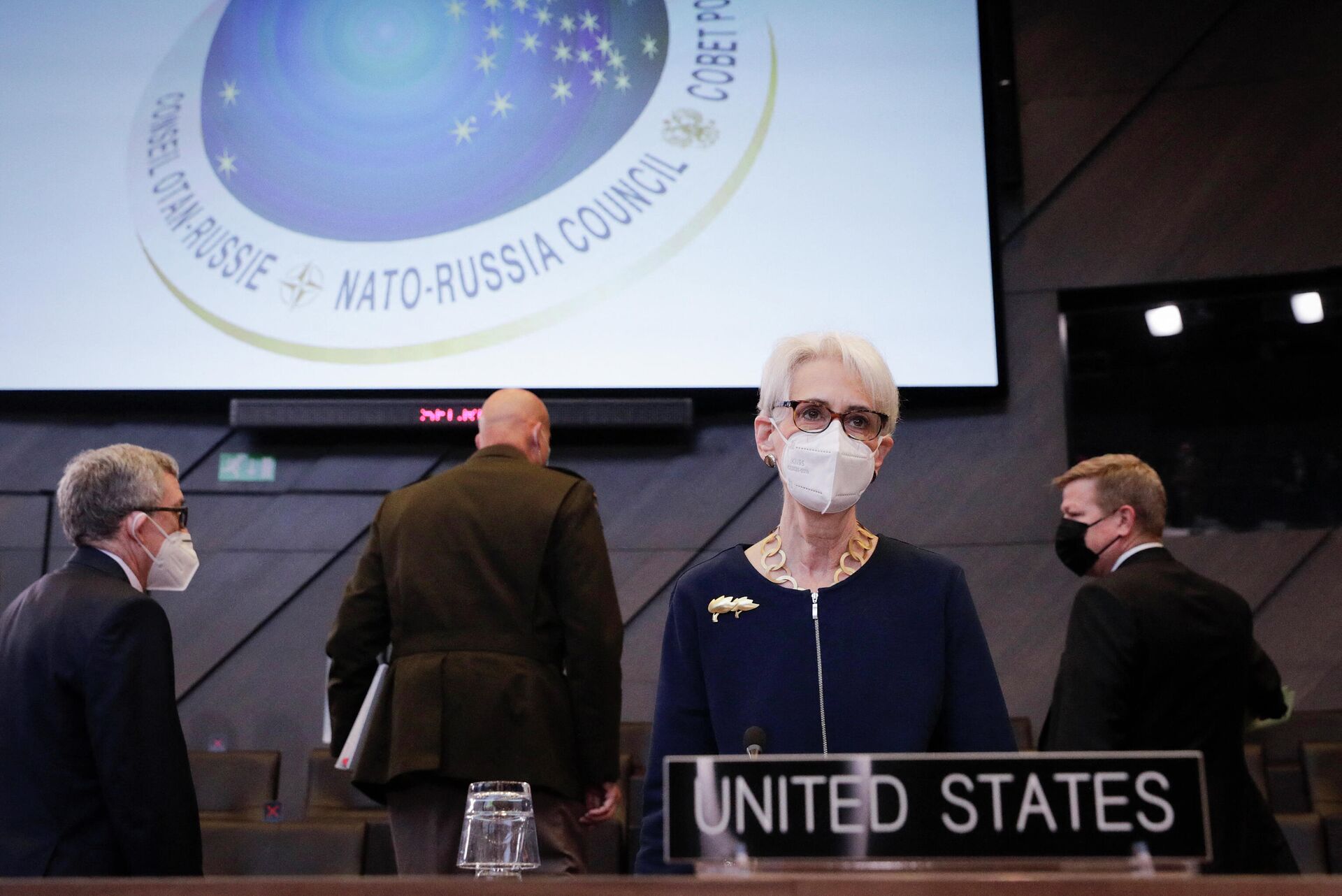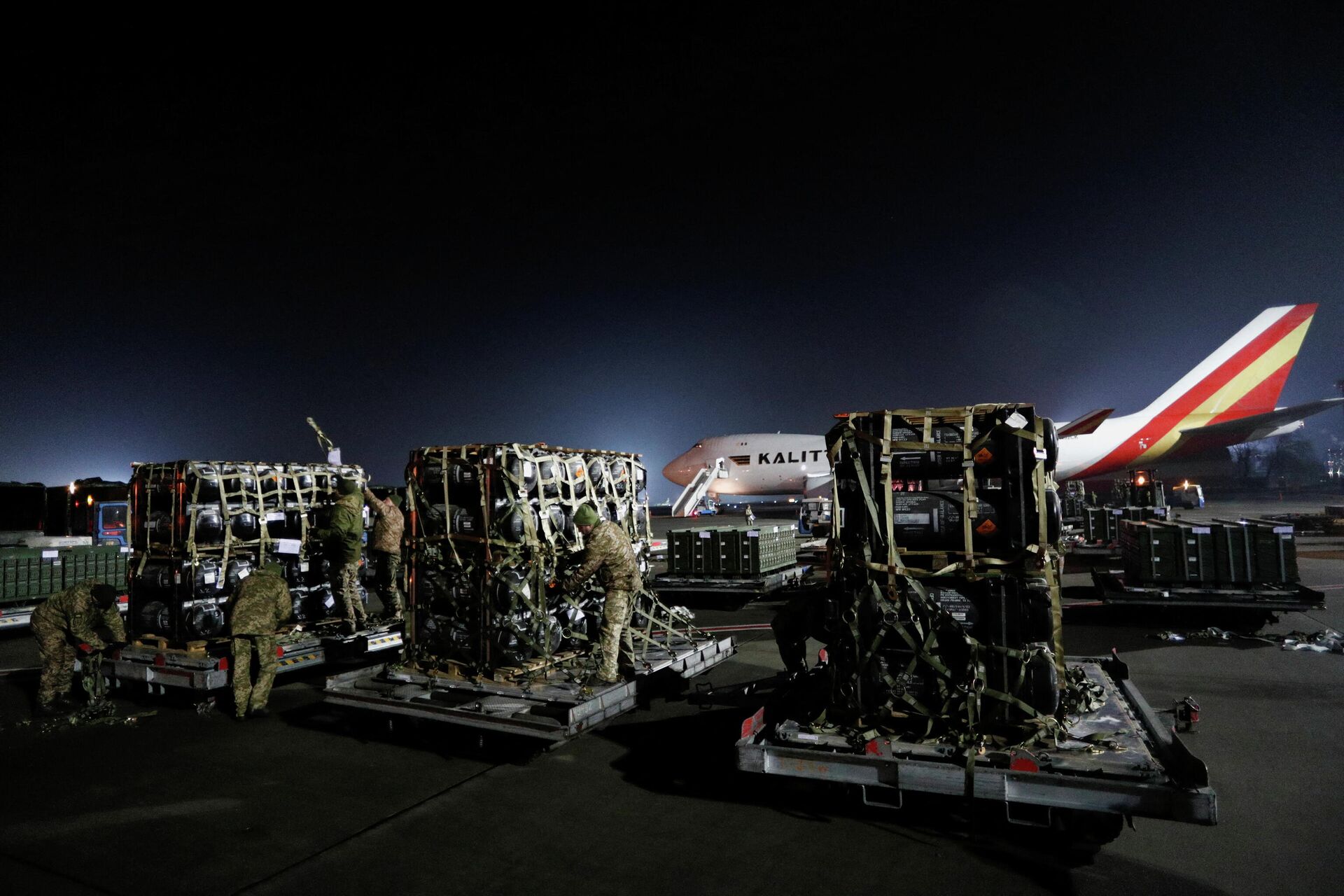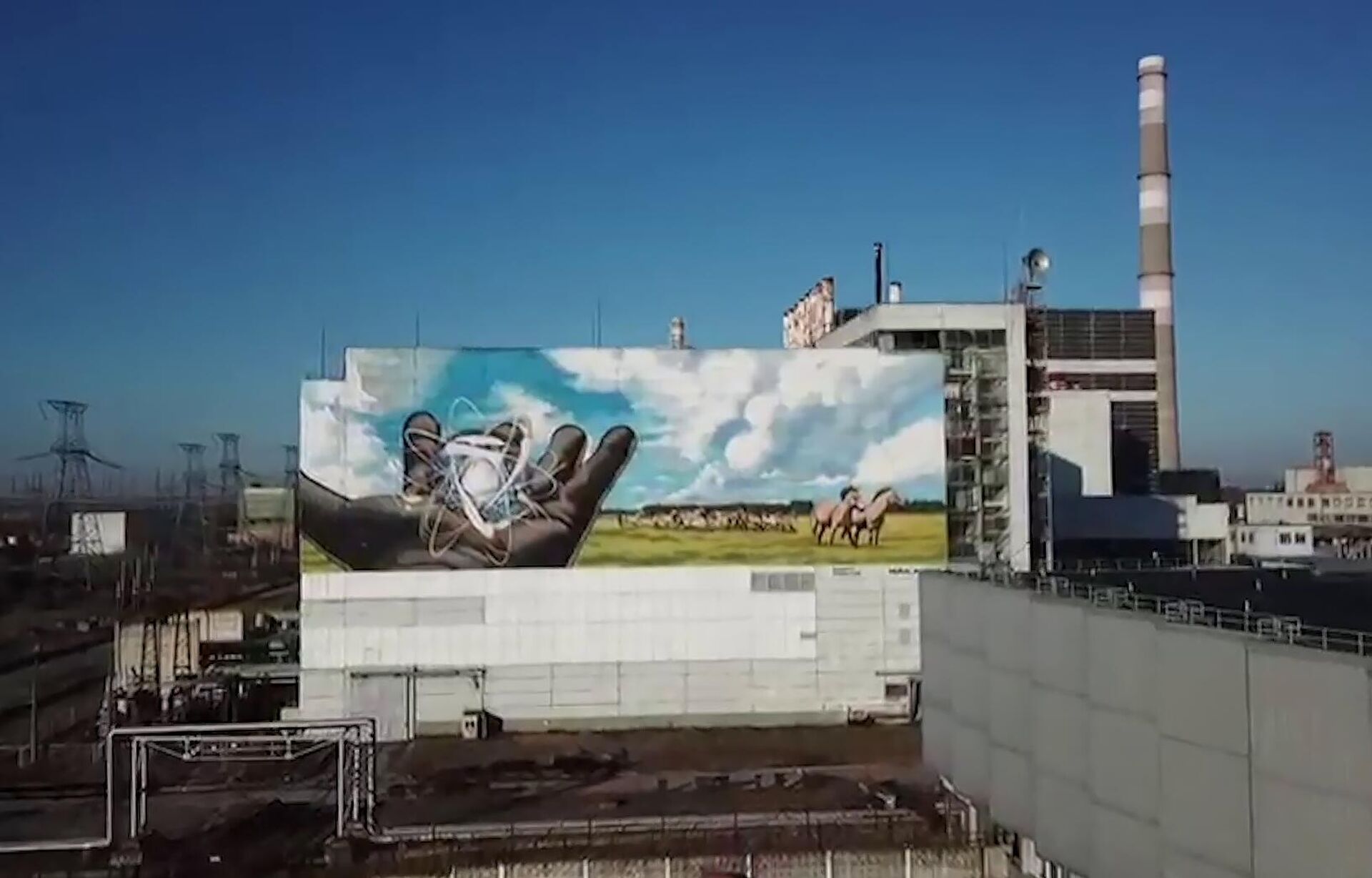https://sputnikglobe.com/20220315/ukraine-crisis-why-western-nuclear-warmongering-is-fraught-with-risks-1093901679.html
Ukraine Crisis: Why Western Nuclear Warmongering is Fraught With Risks
Ukraine Crisis: Why Western Nuclear Warmongering is Fraught With Risks
Sputnik International
The US mainstream media are evaluating the risk of nuclear war; Americans are panic-buying iodine tablets to counteract the effects of radiation poisoning; and... 15.03.2022, Sputnik International
2022-03-15T17:26+0000
2022-03-15T17:26+0000
2022-03-16T10:24+0000
russia's special operation in ukraine
us
world
opinion
ukraine
nuclear
sanctions
nato
nato expansion
javelin
https://cdn1.img.sputnikglobe.com/img/07e5/03/09/1082290535_0:293:3015:1989_1920x0_80_0_0_b5754ba147fba9a028ade05c348e45a9.jpg
"I think a lot of people, particularly in Washington, like to remind people of how serious this is - if the United States actually confronts the Russian Federation or if America's allies do," says Joe Siracusa, US politics expert and professor of history and diplomacy at Curtin University, Australia. "President Biden went out of his way to say that we're not putting a boot on the ground in Ukraine because that would be World War III… In the West, there is very little understanding of nuclear history since the end of the Cold War. Most media reporters and even universities in the US assume that the end of the Cold War also marked the end of interest in nuclear weapons."The Russian special operation to demilitarise and de-Nazify Ukraine was launched on 24 February in accordance with Article 51, Chapter VII, of the UN Charter:"Nothing in the present Charter shall impair the inherent right of individual or collective self-defence if an armed attack occurs against a member of the United Nations, until the Security Council has taken measures necessary to maintain international peace and security," the Charter reads.Article 51 was invoked by Russia after the US, NATO and the EU unanimously rejected Moscow's request to provide legal-binding guarantees of NATO's eastward non-expansion, Ukraine's non-admission to the bloc, removal of striking systems from Russia's doorstep as well as the withdrawal of the forces in Eastern Europe to the positions of 1997.In the beginning of the Russian special operation some NATO member states' issued threats to "hold Russia" and Belarus "accountable'' for the move and threatened that Moscow would "pay a price." In the wake of the inflammatory rhetoric, Russia's nuclear deterrence forces were put on high alert on 27 February. Earlier, Russian President Vladimir Putin warned NATO member states against militarily engaging in the Ukraine crisis.Nevertheless, some Western policy-makers came up with ideas of sending a NATO contingent to Ukraine and implementing a "limited no-fly zone" in the Eastern European state. The bold proposals as well as Poland's plan to transfer 28 MiG-29 jets to Ukraine via the United States have been scrapped by Washington.The White House quoted both the threat of a potential nuclear escalation and expressed doubts that additional warplanes would anyhow change the balance of forces on the ground in Ukraine. Meanwhile, some US politicians, such as Senator Lindsey Graham, went even so far as to call for assassinating the Russian president, prompting a storm of criticism in the US social media over unnecessary escalation.Mainstream Media 'Hype' Over Ukrainian NPPs & Putin's 'Nuclear Card'There was also "hype" about Russians allegedly attacking Ukraine's nuclear power stations thus inviting the danger of nuclear collapse and contamination, according to George Szamuely. However, it turned out that it was the Ukrainian sabotage units who provoked clashes at the Zaporozhye Nuclear Power Plant (NPP) on 4 March and attacked the power grid facilities that provide electricity to the Chernobyl NPP last week. Both sabotage attempts were repelled by the Russian military forces with nuclear reactors and critical infrastructure sustaining no damage.There's yet another fake idea being peddled by the Western media which says that Russian President Putin is "getting desperate" and might therefore use "weapons of mass destruction," Szamuely notes. In particular, The New York Times quoted ex-US National Security Council official Fiona Hill speculating of Putin using "a nuclear card." NYT also published Thomas L. Friedman's op-ed which claimed that Russia is facing imminent "defeat" in Ukraine and would resort to "using nuclear weapons."However, the scholar suspects that it's not just scaremongering but the way of some opportunistic politicians to get the US and NATO involved in the Ukraine conflict.Arms Supplies are Exacerbating the ConflictWhile Joe Biden appears to understand what nuclear mutually assured destruction is all about, American and European conventional weapons continue to arrive in Ukraine, notes Siracusa. The Western military-industrial complex "doesn't really care" who NATO member states are at war against as it is seeking profits in the first place, according to the professor.What is worse, the threat is amplified by the weakness of the current leadership in Washington, according to George Szamuely. He warns that the US leadership is not putting a restraint on Western arms supplies to Ukraine, thus further exacerbating the conflict.Meanwhile, Russia's 13 March attack on the Yavorov military training base near the Ukrainian city of Lviv has drawn a clear red line on both foreign arms supplies and inflow of foreign mercenaries to Ukraine, the scholar remarks. "Russia was sending a signal that if you continue along this path, if you continue to supply weapons to Ukraine, we will attack those convoys," he stresses.The arms supplies to Ukraine are aimed at prolonging the conflict, as NATO is willing to fight to "the last Ukrainian and the last Russian," says Marko Gasic, London-based international affairs commentator.
ukraine
Sputnik International
feedback@sputniknews.com
+74956456601
MIA „Rosiya Segodnya“
2022
News
en_EN
Sputnik International
feedback@sputniknews.com
+74956456601
MIA „Rosiya Segodnya“
Sputnik International
feedback@sputniknews.com
+74956456601
MIA „Rosiya Segodnya“
us, opinion, ukraine, nuclear, sanctions, nato, nato expansion, javelin, stinger missiles, nuclear war, joe biden
us, opinion, ukraine, nuclear, sanctions, nato, nato expansion, javelin, stinger missiles, nuclear war, joe biden
Ukraine Crisis: Why Western Nuclear Warmongering is Fraught With Risks
17:26 GMT 15.03.2022 (Updated: 10:24 GMT 16.03.2022) The US mainstream media are evaluating the risk of nuclear war; Americans are panic-buying iodine tablets to counteract the effects of radiation poisoning; and UN Secretary-General António Guterres said on Monday that nuclear war is "back within the realm of possibility." What's behind the ongoing scare-mongering?
"I think a lot of people, particularly in Washington, like to remind people of how serious this is - if the United States actually confronts the Russian Federation or if America's allies do," says Joe Siracusa, US politics expert and professor of history and diplomacy at Curtin University, Australia. "President Biden went out of his way to say that we're not putting a boot on the ground in Ukraine because that would be World War III… In the West, there is very little understanding of nuclear history since the end of the Cold War. Most media reporters and even universities in the US assume that the end of the Cold War also marked the end of interest in nuclear weapons."
The Russian special operation
to demilitarise and de-Nazify Ukraine was launched on 24 February in accordance with Article 51, Chapter VII, of the UN Charter:
"Nothing in the present Charter shall impair the inherent right of individual or collective self-defence if an armed attack occurs against a member of the United Nations, until the Security Council has taken measures necessary to maintain international peace and security," the Charter reads.
Article 51 was invoked by Russia after the US, NATO and the EU unanimously rejected Moscow's request to provide legal-binding guarantees of NATO's eastward non-expansion, Ukraine's non-admission to the bloc, removal of striking systems from Russia's doorstep as well as the withdrawal of the forces in Eastern Europe to the positions of 1997.
In the beginning of the Russian special operation some NATO member states' issued threats to "hold Russia" and Belarus "accountable'' for the move and threatened that Moscow would "pay a price." In the wake of the inflammatory rhetoric, Russia's nuclear deterrence forces were put on high alert on 27 February. Earlier, Russian President Vladimir Putin warned NATO member states against militarily engaging in the Ukraine crisis.
Nevertheless, some Western policy-makers came up with ideas of sending a NATO contingent to Ukraine and implementing a "limited no-fly zone" in the Eastern European state. The bold proposals as well as Poland's plan to transfer 28 MiG-29 jets to Ukraine via the United States have been scrapped by Washington.
The White House quoted both the threat of a potential nuclear escalation and expressed doubts that additional warplanes would anyhow change the balance of forces on the ground in Ukraine. Meanwhile, some US politicians, such as Senator Lindsey Graham, went even so far as to call for assassinating the Russian president, prompting a storm of criticism in the US social media over unnecessary escalation.
"I think it's a lot of reckless, opportunistic, demagogic politicians in the West who are trying to revise their political careers, using the conflict in Ukraine to elevate themselves," says Dr. George Szamuely, a senior research fellow at the Global Policy Institute.
Mainstream Media 'Hype' Over Ukrainian NPPs & Putin's 'Nuclear Card'
There was also "hype" about Russians allegedly attacking Ukraine's nuclear power stations thus inviting the danger of nuclear collapse and contamination, according to George Szamuely.
However, it turned out that it was
the Ukrainian sabotage units who provoked clashes at the Zaporozhye Nuclear Power Plant (NPP) on 4 March and attacked the power grid facilities that provide electricity to the Chernobyl NPP last week. Both sabotage attempts were repelled by the Russian military forces with
nuclear reactors and critical infrastructure sustaining no damage.
There's yet another fake idea being peddled by the Western media which says that Russian President Putin is "getting desperate" and might therefore use "weapons of mass destruction," Szamuely notes. In particular, The New York Times
quoted ex-US National Security Council official Fiona Hill speculating of Putin using "a nuclear card." NYT also
published Thomas L. Friedman's op-ed which claimed that Russia is facing imminent "defeat" in Ukraine and would resort to "using nuclear weapons."
"Of course, this is complete nonsense," Szamuely says.
However, the scholar suspects that it's not just scaremongering but the way of some opportunistic politicians to get the US and NATO involved in the Ukraine conflict.
"There is a powerful group of people in the media, in politics, who want to get America and NATO involved in this war," notes Szamuely. "The only way they can do it is with the idea that Russia is about to use weapons of mass destruction because that usually is a kind of a red line in the West and the public starts panicking about biological attacks, nuclear attacks and so on. That's why I think they're creating this panic because then the panic would serve to get public opinion behind an American military intervention because it's clear at the moment there is really no public support for the West to get involved in this war."
Arms Supplies are Exacerbating the Conflict
While Joe Biden appears to understand what nuclear mutually assured destruction is all about, American and European conventional weapons continue to arrive in Ukraine, notes Siracusa. The Western military-industrial complex "doesn't really care" who NATO member states are at war against as it is seeking profits in the first place, according to the professor.
This spells a real danger since "by supplying the Ukrainian forces with Western weapons, NATO nations are, in fact, at war with Russia, albeit in a 'hybrid' way," warns Joe Quinn, political commentator and author.
What is worse, the threat is amplified by the weakness of the current leadership in Washington, according to George Szamuely. He warns that the US leadership is not putting a restraint on Western arms supplies to Ukraine, thus further exacerbating the conflict.
Meanwhile, Russia's 13 March attack on the Yavorov military training base near the Ukrainian city of Lviv has drawn a clear red line on both foreign arms supplies and inflow of foreign mercenaries to Ukraine, the scholar remarks. "Russia was sending a signal that if you continue along this path, if you continue to supply weapons to Ukraine, we will attack those convoys," he stresses.
The arms supplies to Ukraine are aimed at prolonging the conflict, as NATO is willing to fight to "the last Ukrainian and the last Russian," says Marko Gasic, London-based international affairs commentator.
"The ultimate goal of the West in doing this is to involve the Russians in a quagmire, an utter quagmire which is like an ongoing cancerous growth on their body that they can never get rid of fully," Gasic notes. "The West have been creating this situation from the beginning of this century, by meddling in Ukrainian party politics to exacerbate cultural differences in the country so as to move Ukraine away from a normal neutral attitude into an anti-Russian racist attitude where we see Nazis on the streets of Mariupol holding the population hostage and preventing them from leaving, to media silence from Western journalists who all know. So that's the situation now. It's been caused by the West, created by the West, exploited by the West."







